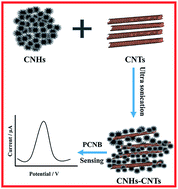Highly sensitive electrochemical sensing of para-chloronitrobenzene using a carbon nanohorn–nanotube hybrid modified electrode†
Abstract
The widespread presence of para-chloronitrobenzene (PCNB) has caused serious impacts on the environmental agencies and human health, hence the quantitative and qualitative sensing of PCNB is very important. Herein, a novel three-dimensional nanohybrid composed of carbon nanohorns and carbon nanotubes (CNH–CNT) was prepared via a simple ultrasonication process, and then, the obtained CNH–CNT nanohybrid was used to modify an electrode for the electrochemical sensing of PCNB. Under the optimized conditions, the results showed that the CNH–CNT nanohybrids could exhibit electrochemical sensing performance toward PCNB detection due to the synergetic properties of CNHs and CNTs, and a wide linear range from 0.1 to 70.0 μM and a low detection limit of 5.9 nM were obtained for the determination of PCNB. Finally, the developed method was successfully applied in the determination of PCNB in real water samples.



 Please wait while we load your content...
Please wait while we load your content...